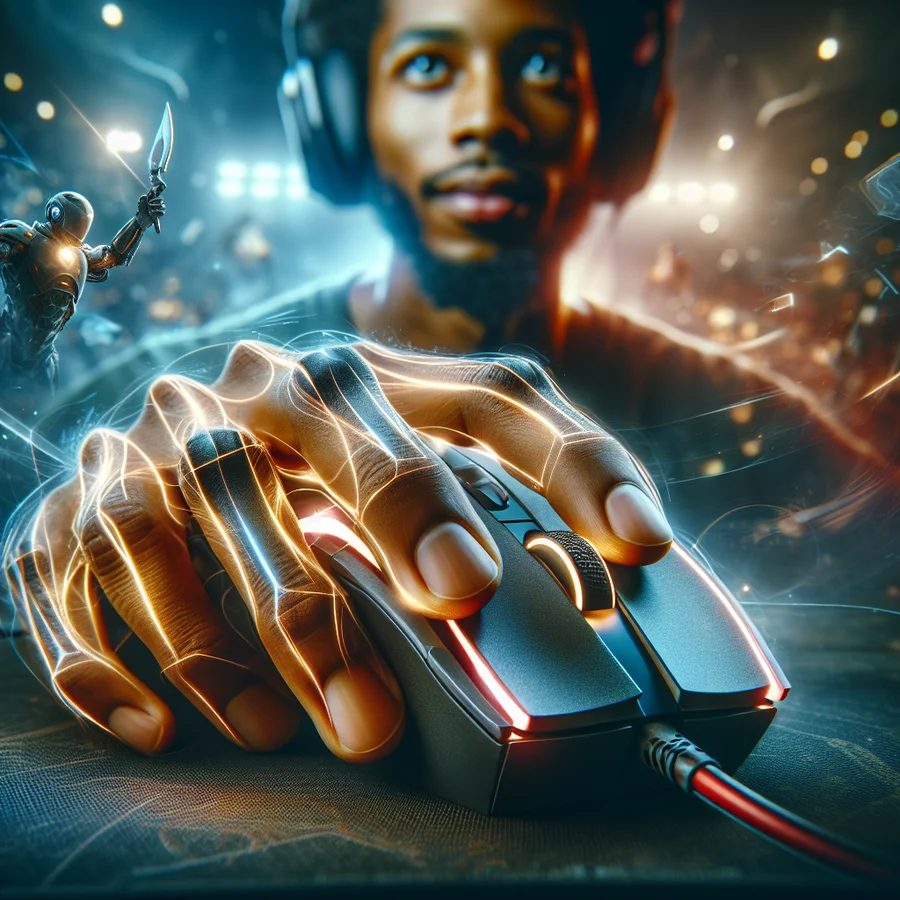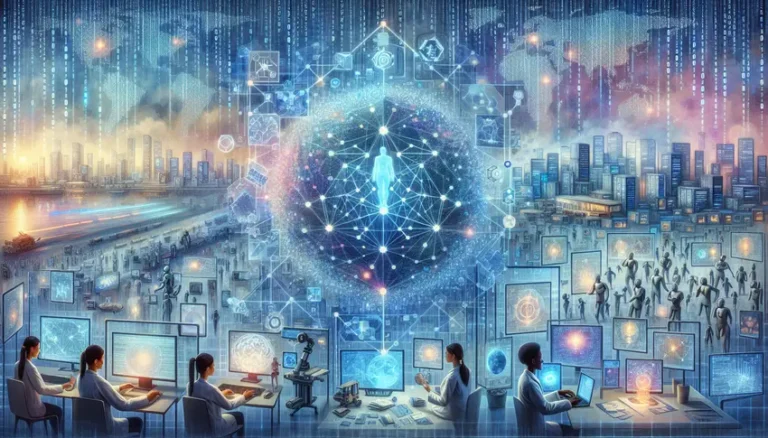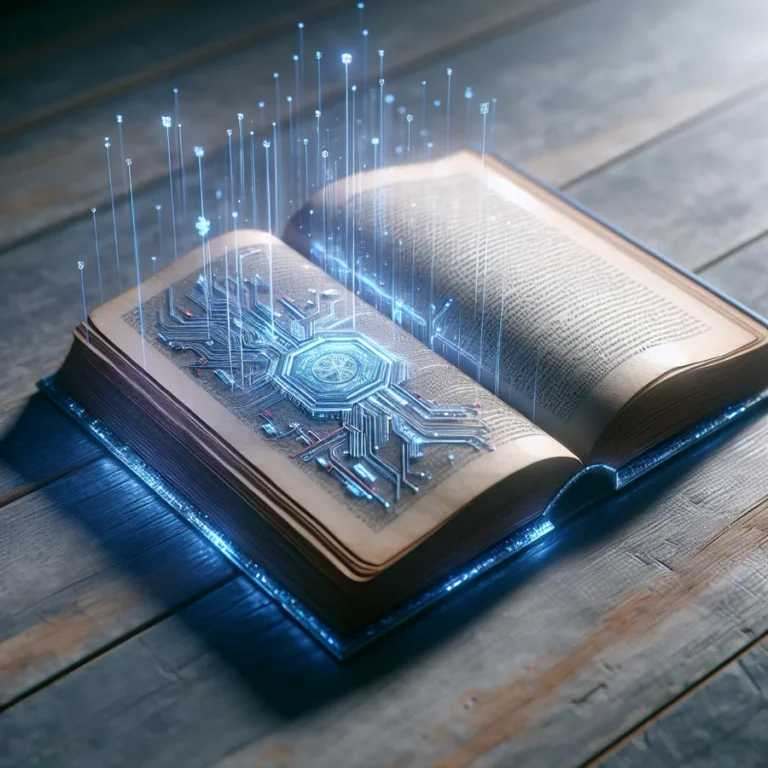AI in Gaming: Enhancing Gameplay and Personalizing Experiences
Are you ready to explore the exciting world where artificial intelligence meets video games? AI in gaming is no longer a futuristic dream. It’s here, and it’s changing how games are made and played. This guide will walk you through how AI enhances everything from the characters you interact with to the worlds you explore, creating more immersive and personalized gaming experiences.
Imagine games that adapt to your skill level, offer unique challenges tailored just for you, and feature characters that feel truly alive. That’s the power of AI in gaming. Let’s dive in and see how it’s revolutionizing the industry!
The Impact of AI in Gaming
AI is transforming the gaming industry in profound ways. It’s not just about making enemies smarter; it’s about creating richer, more dynamic, and personalized experiences for every player.
What is AI in Gaming?
AI in gaming refers to using intelligent systems, algorithms, and machine learning to create more interactive and immersive gaming experiences. Think of it as giving games the ability to “think” and react in ways that feel more realistic and engaging.
AI allows games to adapt to your behavior, create responsive environments, and even generate unique content. This means no two playthroughs are ever quite the same. It makes games feel more alive and less predictable.
Note: AI isn’t about replacing human creativity. It’s about augmenting it, giving developers powerful tools to create even better games.
The Evolution of AI in Gaming
AI in gaming has come a long way. Early games used simple, pre-programmed behaviors. Now, AI can learn from player actions, adapt strategies, and even generate entire game worlds.
Here’s a quick look at the evolution:
- Early Days: Simple rule-based systems, like the ghosts in Pac-Man.
- Mid-Era: More complex AI for enemy behavior and basic pathfinding.
- Modern Era: Machine learning, neural networks, and procedural generation.
- Future: AI-driven narratives, personalized experiences, and enhanced realism.
Reminder: The future of AI in gaming is about creating experiences that are unique to each player, offering endless possibilities for engagement and entertainment.
Enhancing Gameplay with AI in Game Development
AI is not just about making games look better; it’s about making them play better. Here are some key ways AI enhances gameplay:
Smarter NPCs (Non-Playable Characters)
Forget the days of NPCs standing around, repeating the same lines. AI empowers NPCs to react dynamically to your actions, learn from your strategies, and even exhibit human-like behaviors.
Here’s how AI is making NPCs smarter:
- Learning from Player Strategies: NPCs can recognize patterns in your gameplay and adjust their tactics accordingly.
- Human-Like Behaviors: AI enhances realism, allowing NPCs to respond contextually to different situations.
- Example: In games like The Last of Us, enemies coordinate attacks based on your actions, creating a more challenging and immersive experience.
Note: Smarter NPCs make the game world feel more alive and reactive, enhancing the sense of immersion and player agency.
Procedural Content Generation (PCG) with AI Tools for Game Development
Imagine a game world that’s different every time you play. That’s the power of procedural content generation (PCG), and AI is making it even better.
AI tools for game development facilitate PCG, enabling:
- Endless Variability: AI creates unique game levels, preventing monotony and keeping things fresh.
- Cost-Efficiency: Reduces the need for large development teams to create vast game worlds.
- Example: Minecraft uses AI to generate procedural worlds, ensuring a unique experience for every player.
Reminder: PCG with AI allows for the creation of vast and diverse game worlds without the need for manual design, saving time and resources.
Dynamic Difficulty Adjustment (DDA) in AI Game Development
Tired of games that are too easy or too hard? Dynamic Difficulty Adjustment (DDA) uses AI to tailor the game’s difficulty to your skill level in real-time.
AI for game developers is enhancing the player experience through DDA by:
- Adapting to Player Skill Level: If you’re excelling, AI increases difficulty by making enemies smarter or challenges harder.
- Enhancing User Retention: Players stay engaged because the difficulty scales to their abilities, preventing frustration or boredom.
- Example: Resident Evil 4 dynamically adjusts enemy behavior based on your performance.
Note: DDA ensures that games are always challenging but fair, keeping players engaged and motivated.
Personalizing Gaming Experiences with AI
AI is not just about improving gameplay mechanics; it’s about creating experiences that are tailored to you. Here’s how AI is personalizing gaming experiences:
AI-Powered Personalization in AI Game Design
Imagine a game that knows what you like and adapts to your preferences. AI in video game development allows developers to customize experiences by:
- Content Recommendations: AI suggests missions, skins, and power-ups based on your behavior.
- Tailored Challenges: AI-driven missions adapt to your preferences and play style.
- Example: PUBG Mobile recommends weapons based on your past choices.
Reminder: Personalization makes games more engaging and enjoyable by catering to individual preferences and play styles.
AI in Social Gaming and Matchmaking
Multiplayer games are more fun when you’re playing with people of similar skill levels. AI optimizes multiplayer experiences by:
- Balancing Matchmaking: AI matches you with players of similar skill levels for fair competition.
- Example: Call of Duty Mobile uses AI to pair players based on performance data.
Note: AI-powered matchmaking ensures fair and competitive multiplayer experiences, enhancing player satisfaction.
AI in Game Design and Development Processes
AI is streamlining the game development process itself. AI tools for game development help by:
- Automating Testing: AI detects bugs and performance issues, saving time and resources.
- Generating Assets and Animations: AI creates realistic characters and environments, reducing manual labor.
- Optimizing Resources: AI-powered compression reduces file sizes without compromising quality.
- Example: AI helps indie developers create high-quality games with fewer resources.
Reminder: AI is making game development more efficient, allowing developers to focus on creativity and innovation.
AI-Driven Graphics and Realism
Beyond gameplay and personalization, AI is also revolutionizing the visual aspects of gaming.
Enhancing Visual Quality
AI is improving textures and creating photorealistic gaming experiences. AI upscaling enhances textures, making games look sharper and more detailed.
Example: Shadowgun Legends uses AI techniques to enhance mobile game graphics.
Augmented & Virtual Reality Integration
AI enables real-time object recognition, motion tracking, and immersive experiences in AR and VR games. AI in video game development is making AR and VR games more interactive and realistic.
Example: Pokémon GO uses AI to interact with real-world environments.
AI for Advanced Physics & Animation
AI simulates realistic movements and environmental effects. AI enhances fluid dynamics, jumping physics, and character animations, making games feel more believable.
Example: AI-driven motion capture enhances realism in sports and fighting games.
The Role of AI in Mobile Game Development
The mobile gaming industry has exploded in recent years. AI in mobile game development is crucial for enhancing gaming experiences in this space.
Enhancing Mobile Gaming Experiences with AI
AI is revolutionizing mobile gaming by:
- Improving NPC behavior.
- Generating procedural content.
- Adjusting difficulty dynamically.
- Personalizing player experiences.
These advancements make mobile games more immersive, engaging, and fun.
Tools and Technologies for AI in Mobile Games
Several AI game development tools help streamline the creation of advanced mobile gaming experiences. These tools utilize AI to generate textures, animations, and game mechanics, making development more efficient.
Some popular AI-powered tools in the industry include:
- Unity ML-Agents: A toolkit for training intelligent agents in Unity.
- OpenAI’s Reinforcement Learning Models: Powerful models for creating adaptive AI.
- AI-Driven NPC Behavior Scripting Engines: Tools for creating realistic and dynamic NPC behavior.
Optimizing Performance and Scalability in Mobile Games
AI plays a crucial role in optimizing game performance across different mobile platforms. It helps developers balance graphics, physics, and processing requirements, ensuring smooth gameplay on both high-end and low-end mobile devices.
AI-driven optimization also reduces latency in multiplayer games, improving the overall gaming experience.
Balancing AI Autonomy and Player Control
It’s important to strike a balance between AI autonomy and player control. If AI systems are too dominant, players might feel like their choices don’t matter. On the other hand, if AI is too passive, the game may lack challenge.
Developers must carefully craft AI that responds intelligently to player actions while still allowing room for meaningful decision-making. Techniques such as adaptive difficulty, procedural storytelling, and responsive AI behaviors can help achieve this balance.
The goal is to create AI that enhances immersion and challenge without making the player feel like they are merely reacting to a pre-determined script. By maintaining this equilibrium, developers ensure that AI remains a compelling part of gameplay without overshadowing the player’s role in shaping their own experience.
Ethical Considerations of AI in Gaming
As AI becomes more prevalent in gaming, it’s important to consider the ethical implications.
Data Privacy Concerns
AI-driven personalization and matchmaking rely on collecting and analyzing player data. Developers must ensure that data collection aligns with privacy laws, such as the GDPR (General Data Protection Regulation) in Europe and the CCPA (California Consumer Privacy Act) in the U.S.
Players should be informed about how their data is used, given the option to opt out, and assured that their data is stored securely.
By implementing strong encryption, clear consent policies, and anonymization techniques, developers can create AI-driven personalization systems that respect user privacy while still delivering engaging experiences. Ethical AI design fosters trust, ensuring that personalization benefits both players and developers without compromising privacy.
Mitigating AI Misuse
AI can be misused to implement “pay-to-win” mechanics or intrusive monetization strategies. Developers must prioritize ethical AI implementation by designing systems that enhance player experience rather than exploit frustration for profit.
Ethical AI should focus on improving immersion, creating adaptive narratives, and enriching NPC behavior, making games more dynamic and engaging. Regulatory oversight and industry standards can be crucial in ensuring responsible AI use.
The Future of AI in Gaming
The future of AI in gaming is bright. As AI continues to evolve, we can expect even more immersive, personalized, and dynamic gaming experiences.
Predicted Advancements
Some potential advancements include:
- AI-Generated Narratives: AI could create deeply personalized, dynamic storylines that change based on player choices.
- Voice and Gesture Controls: Seamless integration of AI-powered voice and gesture controls could make games more interactive and immersive.
- AI in Cloud Gaming: As cloud-based gaming becomes more prevalent, AI-powered real-time processing could create even more expansive game worlds and experiences.
Opportunities for Indie Developers
AI tools are democratizing game development. Smaller studios and indie developers now have access to powerful AI-driven game design tools that allow them to create high-quality games without needing large teams or big budgets.
This opens up new opportunities for innovation and creativity in the gaming space.
Conclusion
AI in gaming is revolutionizing how games are created and experienced. From smarter characters and personalized challenges to stunning visuals and ethical considerations, AI is shaping the future of the industry. By embracing these advancements, developers can create games that are more engaging, immersive, and tailored to each player’s unique preferences. As AI continues to evolve, the possibilities for innovation in gaming are endless, promising a future where games are more dynamic, responsive, and entertaining than ever before.
FAQs
What is the role of AI in game development?
AI in game development automates tasks, enhances player experiences, and creates dynamic environments. It powers smarter NPCs, procedural content generation, and adaptive difficulty levels.
How does AI enhance gameplay?
AI enhances gameplay by creating smarter NPCs, generating unique content, and adjusting difficulty in real-time to match player skill levels.
What are some examples of AI in gaming?
Examples include AI-powered NPCs in The Last of Us, procedural world generation in Minecraft, and dynamic difficulty adjustment in Resident Evil 4.
How is AI used for personalization in gaming?
AI personalizes gaming experiences by recommending content, tailoring challenges, and matching players with similar skill levels in multiplayer games.
What are the ethical considerations of AI in gaming?
Ethical considerations include data privacy concerns and the potential misuse of AI to create “pay-to-win” mechanics or intrusive monetization strategies.
What is procedural content generation (PCG)?
PCG is a technique where game content, such as levels and landscapes, is generated algorithmically rather than manually. AI enhances PCG by creating more diverse and dynamic content.
How does AI optimize performance in mobile games?
AI helps balance graphics, physics, and processing requirements, ensuring smooth gameplay on various mobile devices and reducing latency in multiplayer games.
What are some AI-driven graphics enhancements in gaming?
AI-driven graphics enhancements include AI upscaling for improved textures, real-time object recognition in AR/VR games, and realistic physics and animation simulations.
What is dynamic difficulty adjustment (DDA)?
DDA is a technique where AI tailors the game’s difficulty to the player’s skill level in real-time, ensuring a challenging but fair experience.
How does AI impact multiplayer matchmaking?
AI optimizes multiplayer experiences by matching players with similar skill levels for fair and competitive gameplay.






